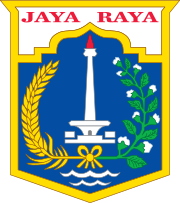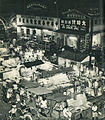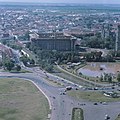The Jakarta Portal Jakarta (/dʒəˈkɑːrtə/; Indonesian pronunciation: [dʒaˈkarta] , Betawi: Jakartè), officially the Special Capital Region of Jakarta (Indonesian: Daerah Khusus Ibukota Jakarta, abbreviated to DKI Jakarta) and formerly known as Batavia until 1949, is the de jure capital and largest city of Indonesia. Lying on the northwest coast of Java, the world's most populous island, Jakarta is the largest metropole in Southeast Asia and serves as the diplomatic capital of ASEAN. The Special Capital Region has a status equivalent to that of a province and is bordered by two other provinces: West Java to the south and east; and (since 2000, when it was separated from West Java) Banten to the west. Its coastline faces the Java Sea to the north, and it shares a maritime border with Lampung to the west. Jakarta's metropolitan area is ASEAN's second largest economy after Singapore. In 2023, the city's GDP PPP was estimated at US$724.010 billion. Jakarta is the economic, cultural, and political centre of Indonesia. Although Jakarta extends over only 661.23 km2 (255.30 sq mi) and thus has the smallest area of any Indonesian province, its metropolitan area covers 7,076.31 km2 (2,732.18 sq mi), which includes the satellite cities of Bogor, Depok, Tangerang, South Tangerang, and Bekasi, and has an estimated population of 32.6 million as of 2022[update], making it the largest urban area in Indonesia and the second-largest in the world (after Tokyo). Jakarta ranks first among the Indonesian provinces in the human development index. Jakarta's business and employment opportunities, along with its ability to offer a potentially higher standard of living compared to other parts of the country, have attracted migrants from across the Indonesian archipelago, making it a melting pot of numerous cultures. Jakarta is one of the oldest continuously inhabited cities in Southeast Asia. Established in the fourth century as Sunda Kelapa, the city became an important trading port for the Sunda Kingdom. At one time, it was the de facto capital of the Dutch East Indies, when it was known as Batavia. Jakarta was officially a city within West Java until 1960 when its official status was changed to a province with special capital region distinction. As a province, its government consists of five administrative cities and one administrative regency. Jakarta is an alpha world city and the ASEAN secretariat's seat. Financial institutions such as the Bank of Indonesia, Indonesia Stock Exchange, and corporate headquarters of numerous Indonesian companies and multinational corporations are located in the city. Jakarta's main challenges include rapid urban growth, ecological breakdown, air pollution, gridlocked traffic, congestion, and flooding due to subsidence (sea level rise is relative, not absolute). Part of North Jakarta is sinking up to 17 cm (6.7 inches) annually, meanwhile the southern part is relatively safe. This has made the northern part of the city more prone to flooding and one of the fastest-sinking capitals in the world. In response to these challenges, in August 2019, President Joko Widodo announced plans to move the capital from Jakarta to the planned city of Nusantara, in the province of East Kalimantan on the island of Borneo. The MPR approved the move on 18 January 2022. The Indonesian government is not abandoning Jakarta after announcing plans to move the country's capital, its planning minister said, pledging to spend US$40 billion, which is more than the cost to build Nusantara, to save the city in the next decade. (Full article...) Selected article -Batavia was the capital of the Dutch East Indies. The area corresponds to present-day Jakarta, Indonesia. Batavia can refer to the city proper or its suburbs and hinterland, the Ommelanden, which included the much larger area of the Residency of Batavia in the present-day Indonesian provinces of Jakarta, Banten and West Java. The founding of Batavia by the Dutch in 1619, on the site of the ruins of Jayakarta, led to the establishment of a Dutch colony; Batavia became the center of the Dutch East India Company's trading network in Asia. Monopolies on local produce were augmented by non-indigenous cash crops. To safeguard their commercial interests, the company and the colonial administration absorbed surrounding territory. (Full article...) Selected image - Jakarta History Museum at Fatahillah Square.
In this month
Related portalsSelected biography -Ali Sadikin (7 July 1926 – 20 May 2008) was an Indonesian politician who served as the fourth governor of Jakarta from 1966 until 1977. Prior to becoming governor, he served as Minister of Transportation from 1963 until 1966 and Coordinating Minister for Marine Affairs from 1964 until 1966. He also served as Chairman of the Football Association of Indonesia from 1977 until 1981. Born to parents of ethnic-Sundanese descent, Ali attended the Semarang Shipping Science Polytechnic during the Japanese occupation period. During the Indonesian National Revolution, he joined the People's Security Agency Navy, the predecessor to the Indonesian Navy, and fought against the Dutch during Operation Product and Operation Kraai. Following the end of the national revolution, Ali remained in the navy and fought against the Permesta rebel movement in the late 1950s. In 1963, he was appointed Minister of Transportation by President Sukarno. A year later, he was appointed coordinating minister of the newly formed Coordinating Ministry for Maritime and Investments Affairs. On 28 April 1966, Ali was appointed governor of Jakarta, becoming the first governor in Indonesia to be sworn-in at the Merdeka Palace. As governor, Ali carried out the construction of Jakarta's infrastructure. He constructed the Ismail Marzuki Park, Ragunan Zoo, Ancol Dreamland, and a number of other infrastructure projects. Notably, Ali allowed the construction of night entertainment projects, as well allowing entertainment in the form of gambling in Jakarta. With taxes generating from gambling being used to build the city and build the Jakarta Islamic Centre. Ali's governorship also saw the revival of Betawi culture in Jakarta, with the increased popularity of Ondel-ondel performances and the Betawi mask dance. (Full article...)
General imagesThe following are images from various Jakarta-related articles on Wikipedia.
Did you know (auto-generated)
TopicsCategoriesWikiProjectsWant to help?:
Associated WikimediaThe following Wikimedia Foundation sister projects provide more on this subject:
Discover Wikipedia using portals |

















































































